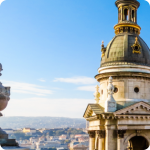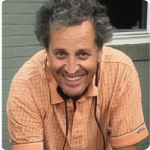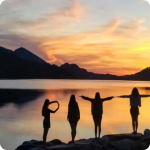Past Events

- Molly McSweeney
- Global Hub
Join us and celebrate Hungarian culture through local history and food. Representatives of Hungary related organizations and resources, both on and off campus, will provide remarks on the Hungarian Nationality Room, Hungary related material in the Pitt archives, and the vibrant history of Pittsburgh's Hungarian community.
Remarks:
Kati Csoman, Director, Nationality Rooms and Intercultural Exchange Programs
Jonathan Naser, Chair, Hungarian Nationality Room Committee
Viktoria Batista, Associate Professor of Hungarian, LCTL
Éva Lovra, Hungarian Fulbright Visiting Professor
Clare Withers, University of Pittsburgh Library System
Dan Pennell, University of Pittsburgh Library System
Katherine Novak, Chair, Board of National Directors, William Penn Association
Judy Torma, Owner, Huszar Restaurant

- various
- Global Hub
Join us and celebrate Hungarian culture through local history and food. Representatives of Hungary-related organizations and resources, both on and off campus, will provide remarks on the Hungarian Nationality Room, Hungary-related material in the Pitt archives, and the vibrant history of Pittsburgh’s Hungarian community.
Remarks:
Kati Csoman, Director, Nationality Rooms
and Intercultural Exchange Programs
Jonathan Naser, Chair, Hungarian
Nationality Room Committee
Viktoria Batista, Associate Professor of
Hungarian, LCTL
Éva Lovra, Hungarian Fulbright Visiting
Professor
Clare Withers, University of Pittsburgh
Library System
Dan Pennell, University of Pittsburgh
Library System
Katherine Novak, Chair, Board of National
Directors, William Penn Association
Judy Torma, Owner, Huszar Restaurant

- Emily Couch, Elisabeth Zentos, Gabriela Iveliz Rosa-Hernandez
- Zoom
Join us to learn more about the REEES Think Tank Program, its accomplishments and insights from the past year, hear student feedback, and help us brainstorm future possibilities. Our mission is to advance Inclusion, Diversity, Accessibility, and Scholarship (IDEAS) in Russian, East European, and Eurasian Studies (REEES). The IDEAS REEES Think Tank is co-sponsored by REEES centres from Stanford University, the University of Pittsburgh, the University of Kansas, The University of Texas at Austin, Ohio State University, Harvard University, the University of California Berkeley, Arizona State University, Indiana University Bloomington, University of Illinois Urbana-Champaign, and by the US Russia foundation.

- Zoom
The University of Pittsburgh and the International Studies Consortium of Georgia (ISCOG) invite you to join the introductory session in an ongoing series focused on development, conservation, and sustainability contrasting dynamics and processes in different world regions. The sessions have been designed to help educators develop and enhance global content complementing their curricula. In addition to learning about thematic local/global intersections, educators will also explore Pitt’s Historical context, Ethics, Language proficiency, Media literacy, Social science methodologies (HELMS) framework for the area, and global studies. This series engages and promotes critical thinking about Amazonia’s current and future sustainability. We will work through approaches to the region’s role in water and food security, clean energy supplies, climate change, art, music, and cultural expressions. This collaborative series is funded through U.S. Department of Education National Resource Center grants. Participants will be able to learn about issues related to Amazonia, particularly related to development, sustainability, and conservation. Improve understanding of diversely different and clearly interconnected dynamics that affect daily lives all over the planet. This will allow educators to have resources at hand to teach in their classroom as well as satisfy the requirement of teaching to the standards. For questions, please email lavst12@pitt.edu

- Dr. Eva Lovra
- Hungarian Nationality Room
The fundamental interconnectedness of all things: Nationality Rooms in the Cathedral of Learning
The interior of a building gives hints about what the building itself can be like. What form, construction period, architectural style determines the image it shows. This lecture seeks to find connections between the designing principles of three of the Nationality and Heritage Rooms of the Cathedral of Learning: the Yugoslav, the Hungarian, and the Austrian Rooms, and finds them in the interior design solutions. Three different rooms and three different nations, the connection between them is not apparent. It becomes more evident when we consider that from the 19th century until the early 20th century, some areas of the three countries were not part of a nation state, but of a multinational empire, Habsburg Central Europe. On the other hand, it’s also interesting to note that the design in two of the rooms (the Hungarian and the Yugoslav Rooms) is the imprint of the nation states that emerged after the First World War (Serbia, Hungary, Austria).
In this presentation we will look at:
- the distinction between nationality and ethnicity and how these two notions are represented or rather underrepresented in the Yugoslav architecture and the Yugoslav Nationality and Heritage Room, which was built in 1939 and designed based on the folk traditions in the then Yugoslav Monarchy
- the connections between folk and neo-baroque in Hungarian art, emphatically in architectural design and music. The close analysis of the designing principles of the folk-themed Hungarian Room (built in 1939) will show how the twenty-year period of becoming a nation state after being part of a multinational empire, brought an increased presence of neo-baroque and modern elements in Hungarian architecture and music. Palpable influences in the works of émigré art, music, and architecture. Béla Bartók’s work preserving and incorporating the Hungarian folk music tradition in his compositions.
3. Last but not least, the presentation show us the unique characteristics of the Austrian room (built in 1996 but designed in 1976). For instance, the way it imitates the architectural style of the period and the Esterházy Palace, where Haydnsaal, or Joseph Haydn's music hall is located. The location in and of itself deserves an elaborate examination: the other palace of the Hungarian prince, Prince Nicolas Esterhazy, the Esterházy Palace, the "Hungarian Versailles" is Hungary's grandest Rococo edifice, located in Eszterháza, today's Fertőd, Hungary.
In summary, the lecture examines the connections between nationality and ethnicity, neobaroque and rococo in architecture and interior design.
Dr. Éva Lovra holds a Ph.D. in Architectural Sciences and has conducted postdoctoral research at the Bartlett School of Architecture, University College London, and at the University of Novi Sad. She is a senior lecturer/adjunct professor at the University of Debrecen's Department of Civil Engineering, teaches in the English-language Urban Systems Engineering M.Sc. program, and serves as a lecturer and doctoral supervisor at the Doctoral School of Earth Sciences.

- Anasa Hicks
- Baker Hall, CMU
The presentation explores the case of Arnaldo Ochoa, a top-ranking general in the Cuban military who once rivalled Fidel Castro in popularity and esteem across the island. News of Ochoa’s arrest, conviction and execution on grounds of corruption and drug-smuggling in 1989 shocked both Cuba and the globe. This talk explores what happened to Ochoa through the lens of his military leadership in Angola, the southern African nation whose independence Cuba had been supporting since 1975. Seemingly just the story of a drug-running general, el caso Ochoa provides an opportunity to examine race, military service, and what it meant to be a Cuban revolutionary 30 years after 1959.

- Geneveve Zubrzyski, Jose Casenova, Sean Guillory
- Zoom
Soviet ideology treated religion as an enemy, a tool of oppression and an expression of backwardness. Militant atheism, the prohibition of religious rituals, and the repression of religious communities aimed to create a secular, rational, and scientific society. Yet, religion mattered in Soviet people’s lives. And with institutional religion restricted, many people expressed their spirituality through “lived religion” - the practice of religion and spirituality in everyday lives. What were the practices of lived religion in the context of state socialism? And how did it converge and diverge with the return of institutionalised religion and spiritual lift after the collapse of communism? REEES Spring 2023 Series, Religion in (Post-Socialism) Societies, will explore the role of religion in socialist and post-socialist societies in eight online discussions on religion and its relations to repression, nation-building, indigenous cultures, and memory. This is a part of REEES’s Spring 2023 lecture series.

- 4130 Posvar Hall

- Katja Wezel
- 3703 Posvar Hall
With the recent developments in Ukraine and Putin's talk on restoring the Soviet aor the Russian Empire, newly independent territories and cities at the former imperial periphery are again in focus. Riga, today's capital of Latvia, belonged to the Russian Empire (1710-1917) and used to be one of imperial Russia's main ports. In the decade before World War I, Riga was the port with the highest turnover, surpassing both Odessa and the capital St. Petersburg. But Riga was never really a "Russian" city: before World War I, only 18 percent of its inhabitance were native Russian speakers. More important for its economic viability were its Latvian, German, and Jewish residents. This talk will map Riga as a port city and trading metropolis using research results obtained through GIS and archival research. It will also highlight the diversity of the people behind Riga's economic success.

- Brightspace Room, Energy Innovation Center 1435 Bedford Avenue
This exhibit will take place from 12-3pm and 5-9pm on Saturday, April 1st. Opening remarks will begin at 7:30pm. Marc Fogel-- a 61-year-old history teacher from Pennsylvania who taught in Moscow at the Anglo-American School-- was taken into custody by Russian authorities in August 2021 and sentenced to 14 years in prison for the possession of medical marijuana. 80 Pittsburgh creatives and counting have committed to "Making a Marc" to shed light on Fogel and other detainees. As hostage negotiations are ongoing amidst Russia's war against Ukraine, the Center for Russian, East European, and Eurasian Studies invites the Pitt community to support this initiative by Pittsburgh's community of creatives. Artist Tom Mosser has been collaborating with Sasha Phillips, one of the Fogel family attorneys to make this day happen with the support of Marc's family.

- Serhy Yekelchyk, Ararat L. Osipian, Ilya Gerasimov, Juliet Johnson
- Zoom
The Future of SEEES Expertise: How Can We Anticipate Tomorrow’s Differences? is the sixth and the last panel of the Decolonization in Focus Series. The Russian war in Ukraine has had innumerable impacts, from personal to political, local, national, and global. One of the many sea changes wrought by the war has been the reckoning within Slavic/Russian & Eurasian Studies over the outsized role Russia has played and continues to play in the field and what could and should be done about it. The invited panelists in this series will consider the relationships of power that have long dominated the region, how they have impacted the field of study, and what, if anything, could and should be done about it. The series has six wide-ranging panels featuring speakers from various disciplines and institutions. Panelists and participants will be encouraged to consider why decolonizing Russian & Eurasian studies matters, how to implement concrete change in their classrooms, and how to conceive of the future of expertise within the field. All sessions will be convened using Zoom, live-streamed via YouTube, and recorded to be made available for later viewing.

- Zita Toth-Shawgo
- Global Hub
As this an annual event since 2002 that is designed to provide undergraduate students, from the University of Pittsburgh and other colleges and universities, with advanced research experiences and opportunities to develop presentation skills, takes place elsewhere at the University on March 31, breakfast & registration, lunch, and the closing ceremony will take place in the Global Hub.

The Undergraduate Research Symposium is an annual event since 2002 designed to provide undergraduate students, from the University of Pittsburgh and other colleges and universities, with advanced research experiences and opportunities to develop presentation skills. The event is open to undergraduates from all majors and institutions who have written a research paper from a social science, humanities, or business perspective focusing on the study of Eastern, Western, or Central Europe, the European Union, Russia, or Central Eurasia.
After the initial submission of papers, selected participants are grouped into panels according to their research topics. The participants then give 10- to 15-minute presentations based on their research to a panel of faculty and graduate students. The presentations are open to the public.
For more information and to apply, please visit: https://www.ucis.pitt.edu/creees/urs.
APPLICATION DEADLINE: January 8, 2023
Limited travel grants are available to help defray travel expenses for accepted participants located outside of the Pittsburgh region.
SYMPOSIUM: March 31, 2023

- Anca Sincan, Tatiana Vagramenko, Sean Guillory
- Zoom
Soviet ideology treated religion as an enemy, a tool of oppression and an expression of backwardness. Militant atheism, the prohibition of religious rituals, and the repression of religious communities aimed to create a secular, rational, and scientific society. Yet, religion mattered in Soviet people’s lives. And with institutional religion restricted, many people expressed their spirituality through “lived religion” - the practice of religion and spirituality in everyday lives. What were the practices of lived religion in the context of state socialism? And how did it converge and diverge with the return of institutionalised religion and spiritual lift after the collapse of communism? REEES Spring 2023 Series, Religion in (Post-Socialism) Societies, will explore the role of religion in socialist and post-socialist societies in eight online discussions on religion and its relations to repression, nation-building, indigenous cultures, and memory. This is a part of REEES’s Spring 2023 lecture series.

- Molly McSweeney
- Global Hub
Join two Pitt alumnae for a student-moderated discussion about their journeys from undergraduates to their work in Pittsburgh and Kenya. During this gathering in the Global Hub, you will hear from Founder and CEO of Kakenya's Dream, and 2023 Exemplary Leader award recipient Kakenya Ntaiya, and from Pitt alumna and Executive Director of Alliance for Refugee Youth Support and Education (ARYSE) Jenna Baron, about how these women's time at Pitt shaped their professional journeys. As we share a lite bite together, you will learn more about important skills for inspiring the next generation of changemakers and how Pitt can help you get there. Register here: https://pitt.co1.qualtrics.com/jfe/form/SV_71FZ2nySjZoVzVk
- ‹ previous
- 26 of 46
- next ›
